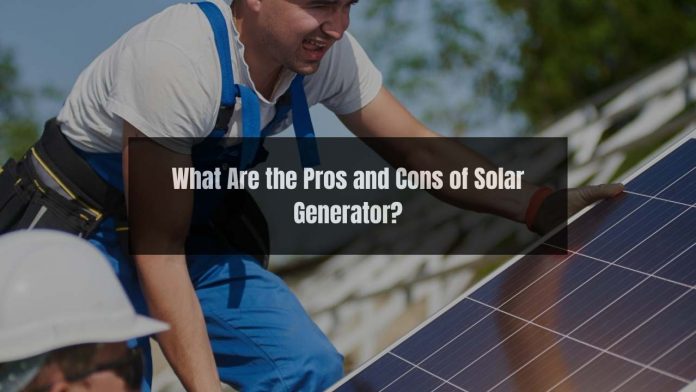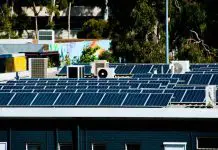You may want to know the pros and cons of solar generator precisely if you’re going to operate and maintain large-scale solar power conveniently.
Solar generators are one of the inexhaustible renewable energy sources, and they can potentially enhance solar energy efficacy.
Large-scale development of solar energy is the best solution for the reduction of carbon emissions, whereas your knowledge of the pros and cons of a solar generator needs to develop.
Let’s first go through the pros and cons of a solar generator of various types in this read-
Solar generators can potentially enhance solar energy efficacy, as it is one of the inexhaustible renewable energy sources.
The large-scale development of solar energy is the best solution for the reduction of carbon emissions.
Solar generators utilize solar photovoltaic (PV) panels to harness the sun’s energy. You can generate electricity by solar generators in regions without energy grid accessibility.
Contents
How do solar generators work?
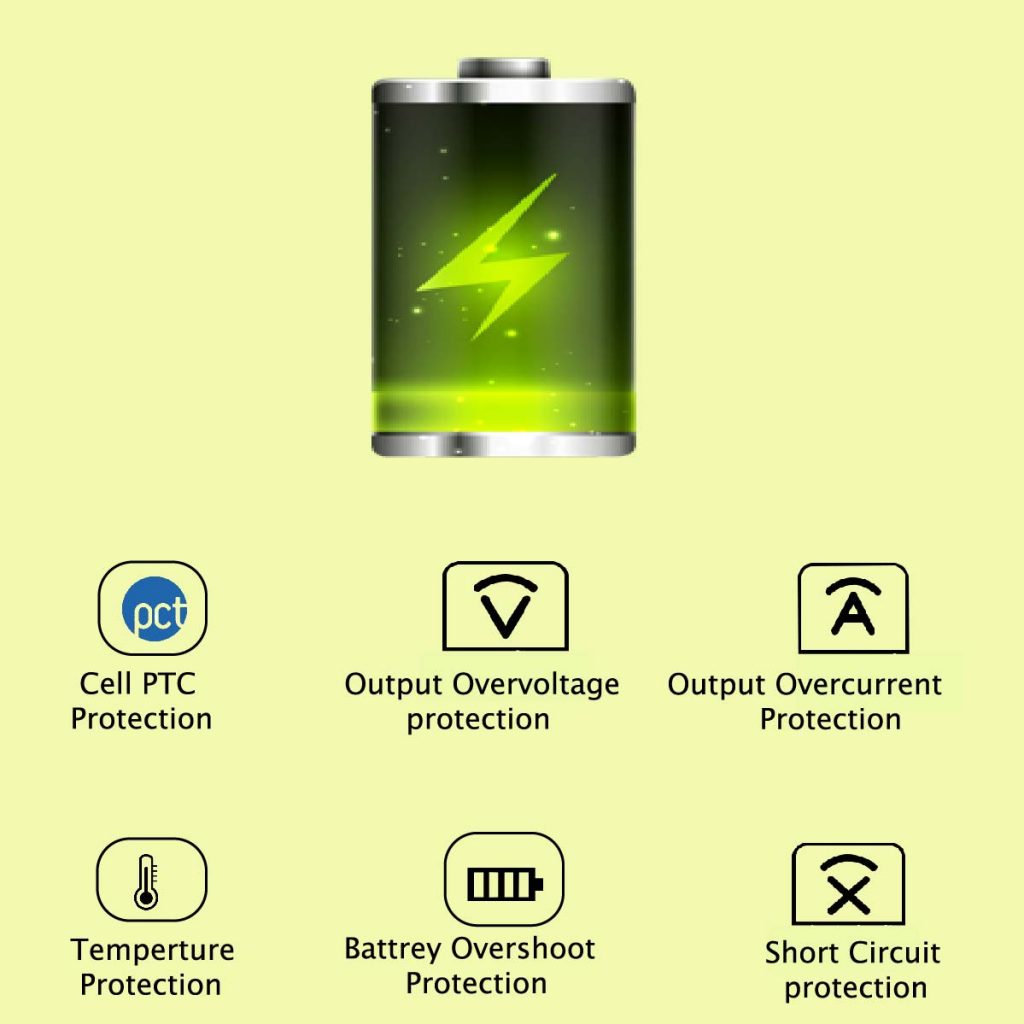
⦁ The PV panels of solar cells convert sunlight to electricity.
⦁ The solar generator’s storage system, such as a battery, stores energy from the solar panels.
⦁ The inverter controls the discharging of solar batteries.
The Solar generator kits are a great first step before moving on to solar home systems (SHS). It might not be an alternative to SHS, but you get to deal with solar power generation basics. If you want to operate and maintain large-scale solar power conveniently, you may want to know the pros and cons of solar generators precisely. Let’s first go through the pros and cons of solar generators of various types.
Types of solar-powered generators and their pros and cons
| Types | Pros | Cons |
| 1. Solar Backup (Standby) Generators | i. Can supply power continuously.
ii. They can power a variety of appliances (incandescent bulbs to television) |
i. They require several batteries to function.
ii. You can’t get instantaneous power to run all the devices for long hours. It takes a lot of time to recharge all these batteries |
| 2. Portable Solar Generators | i. The portable solar generators offer both options for indoor/outdoor activities. You can take portable solar generators to parks, fishing, etc.
ii. They do not make distressing noises to cause discomfort to either neighbors or habitats. |
i. You cannot power electronic appliances of high energy consumption, such as air-conditioners with a typical portable solar generator.
ii. They are quite prone to damage for their portability traits. |
Solar generator application: What can you power with a solar generator?
⦁ Let’s say there is a power outage in your area due to a heavy snowstorm.
⦁ The solar generators in such emergency scenarios may not power a room heater for more extended hours. Still, they will easily keep your cell phones and radios charging.
⦁ You can use portable solar generators to power your requirements for lighter uses during camping or boating.
⦁ The discharging (AC power) rate of the solar generator is inadequate to power several home appliances.
You can conveniently run small electronic devices (cooling fans, mini space heaters, coffee machines, etc.) but not all at the same time.
You can’t either expect to operate bulky electronic devices (small TV, fridge, microwave oven, etc.) for indefinite hours.
Read more on “the uses of solar generators.”
Solar generators to compare with fuel generators: What are the benefits of using Solar Generators?
| Comparison about | Solar Generators | Fuel Generators |
| 1. Pollution | A solar generator doesn’t pose any threat to climate change as it neither produces any greenhouse gas nor toxic chemicals. | Burning fossil fuels (coal, natural gas, petroleum) for electrical energy causes emissions of toxic chemicals (Arsenic- As, Mercury-Hg, etc.) or greenhouse gases (Carbon dioxide- CO2, Nitrous oxide- N2O, etc.) |
| 2. Costs | The cost (initial) of buying a solar generator is relatively high. But the solar generators require minimal maintenance. For instance, the lifespan of a solar panel is 20 – 30 years. |
Fuel generators require a minimal installment cost, unlike solar generators. Yet, there’s a lot of maintenance and repair labor afterward for maximizing the output. |
| 3. Adaptability | The built-in outlets let you plug charging cables or other appliances into the solar generators. | The fuel-powered generators, on the other hand, cannot serve any such purposes. |
Fundamentally what are the advantages and disadvantages of a solar generator kit?
If you are going to depend heavily on a solar generator kit, consider what advantages and disadvantages come with a unit.
Advantages
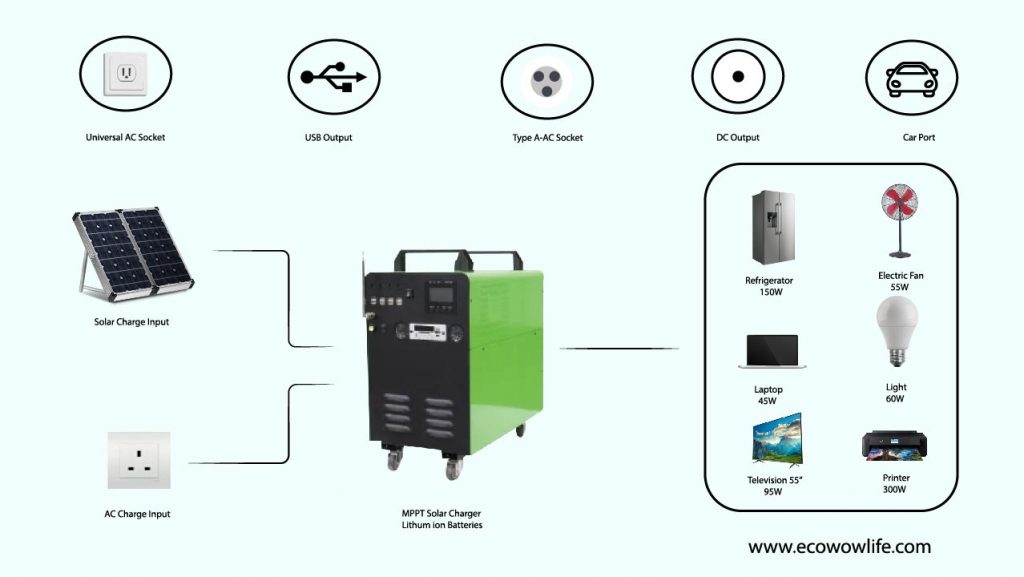
1. All-in-one
A complete all-in-one solar generator kit usually includes all of the necessary components: solar panels, inverter, batteries, cables, etc.
Whereas in a “Solar home system,” you have to go through a robust installation process.
2. Chaining
The solar generator kits are compatible with “chaining.” You can install additional batteries to increase the capacity of your storage device.
3. Efficient
Solar home systems require ample space in the yard or roofs for generating enough power.
The built-in MPPT (maximum power point tracking) module of solar generators recharges the battery efficiently without using a lot of space.
Disadvantages
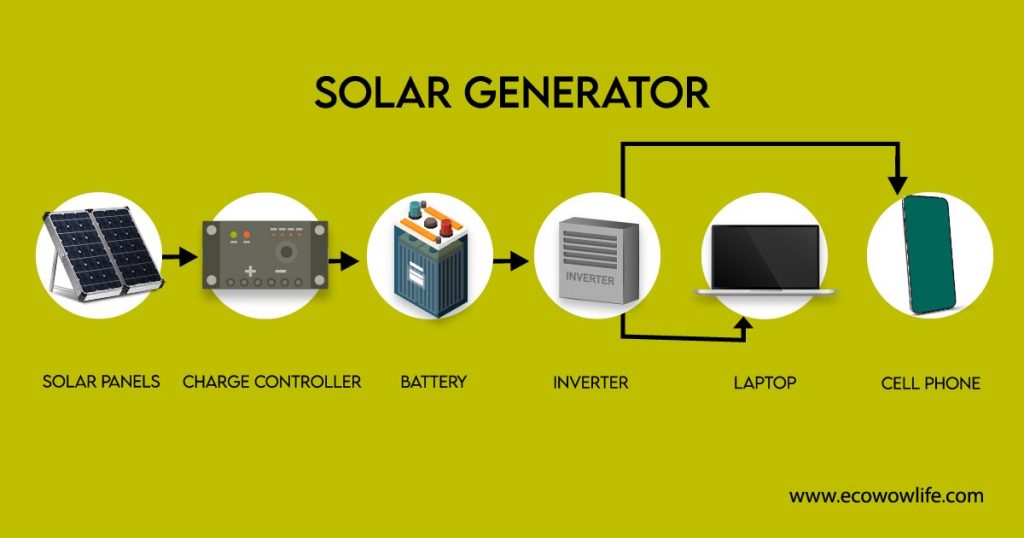
1. Sensitivity (to the temperature)
The portable solar panels are often sensitive to heat.
The optimum operating temperature of solar generators is 0-40 Degree Celsius.
You must keep them at a comparatively cool temperature while maintaining sufficient sunlight exposure.
This phenomenon of restriction is hard to pull as we do not expect any additional preparation.
2. Incompatibility
Solar generator kits often don’t offer wider compatibility with other brands’ products (solar cell, inverter, etc.)
3. Battery limitations
A solar generator of a lead-acid battery can drop voltages with a heavy load.
A battery pack of a few modules can also melt due to overheating when the battery sits idle for months.
Full & final: What are the pros and cons of using solar power generators?
With the definitive pros and cons of solar generators, you can make proper adjustments to your energy requirements.
Pros and Cons of Solar Generator
Pros of solar generators: What are the 3 advantages of solar power generators?
Costs cut
As the energy needs in the day are higher,
⦁ you can meet some of it with portable solar generators inside/outside the house and
⦁ store the rest energy for later use if you are not grid-connected, or the sun doesn’t shine for a couple of days.
Either way, you’ll be able to reduce the electricity bills by a considerable margin.
Weather-independent
If the weather is cloudy or rainy, the efficiency of solar energy generators drops.
However, the weather dependency of solar generators is not noticeable since you can recharge them through
⦁ a regular wall outlet (AC power),
⦁ carport or
⦁ even generator.
Minimal Maintenance
The few prerequisites to maintaining a solar generator are to
⦁ keep the solar generator panels relatively clean from the dust or snow,
⦁ save the batteries from being overcharged (many models show such information on the LED panel of the module) and
⦁ you may require to change to the inverter after a few years (5-10)
Cons of solar generators: What are the 3 disadvantages of solar power generators?
Vulnerability
Solar generators are comparatively new in the solar industry.
Either there’s a lot of confusing information or insufficient information. Customer service is scarce as well.
Suppose any component starts malfunctioning or you require little maintenance. In that case, there are only a few power companies available at your service.
When a user starts repairing the equipment without prior experience, s/he instead damages the product even more.
Smaller capacity
The solar generators come in handy for their portability due to their smaller size.
The solar generators with an easy setup and operation are usually low-capacity power stations.
⦁ Watt-hours less than 100 may not be adequate for more devices.
⦁ Large solar generators can deliver more than 1800 watts, but they are less portable.
Smaller devices with smaller output cannot power plenty of electrical appliances simultaneously.
Environmental Impact
A solar PV panel consists of numerous acids
⦁ Hydrochloric acid- HCl, Sulfuric acid- H2SO4, Nitric acid- HNO3, and
other toxic and hazardous elements
⦁ Lead- Pb, Gallium Arsenide- GaAs, Cadmium- Cd, etc.
The disposal of solar PV cells in open fields causes several pollutions (air, water, and soil).
What is the biggest problem with solar energy generators?
Determining the size and wattage capacity
When you want to go off the grid with the portable solar generators, you’ll have to work out the energy needs and buy off-the-shelf (from reliable vendors, obviously) accordingly.
The ineffective management of storage capacity and the improper usability of solar-powered generators limit their functionality as backup power.
One of the most significant objects to consider when buying a solar generator is calculating the size and wattage capacity for your needs. It is essential to reason how much power you will be saving with the solar generator kits.
- The restricted wattage capacity and time-consuming charging attributes of solar generators can barely make your property resilient against any power outage.
- A smaller solar-powered generator can hardly recharge a notebook.
For emergency preparedness, you need to determine what you need to power, the kW it requires, and for how long you want to power.
All the solar generators will remain ineffective without advanced planning.
People too often oversimplify this phenomenon and buy a solar generator without any research. The expenditure on a solar generator may outweigh the power output (i.e., the saving) from the generator.
Conclusion: Are solar generators worth it owning?
With the emissions of greenhouse gases rising each year, you may consider renewable energy sources to combat climate changes. And if you analyze the pros and cons of solar generators, you’ll definitely be convinced to adopt this beautiful piece of product.
Thanks to a little technology, solar-powered generators turn solar into an affordable and efficient green energy source.
You can power your essential electronic devices without an enormous investment. And finally, the easy operational mode made the solar generators suitable for emergency backup power in your houses or the RVs.
Summary: Essential 3 advantages of owning a solar generator
Inexpensive
The competitive market of solar systems such as solar energy storage devices complements the fancy solar generator market increasingly.
Portability
Solar generator panels are typically smaller. The portability traits of solar generators let you reposition the solar generator panels frequently.
You can bring it on your weekend trip or inside the house when there’s a heavy storm outside.
Capacity building
Solar generators can satisfy various small-scale energy requirements. You can make a preference for installing a solar generator kit before undertaking an enormous capacity-building process of solar home systems.

